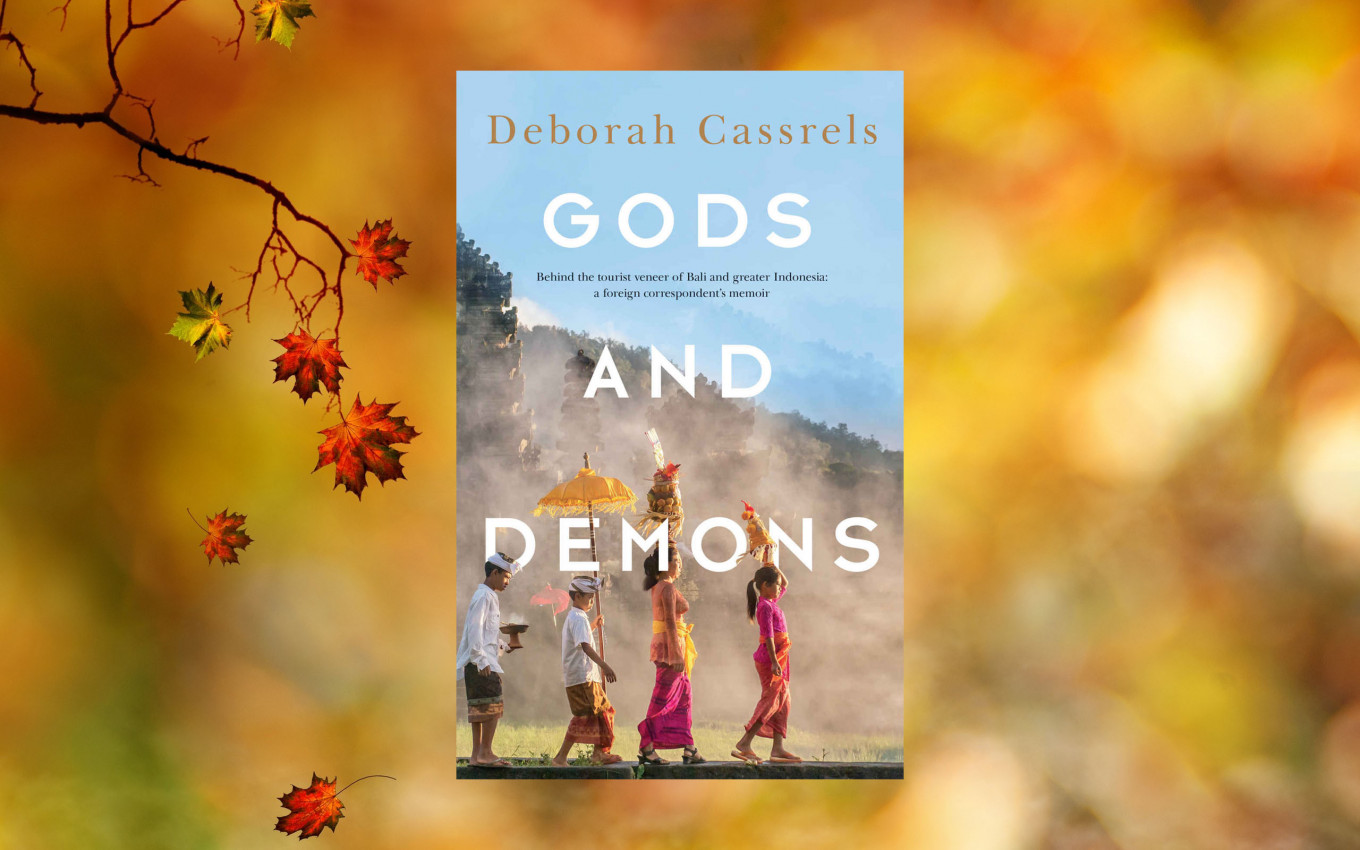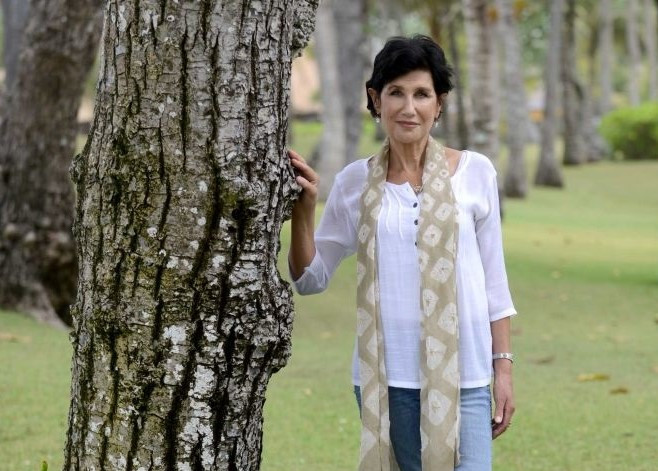‘Gods and Demons’: Indonesia through the prism of Bali
Australian journalist Deborah Cassrels gets the diversity that characterizes Indonesia by reporting from Bali rather than Jakarta. In Gods and Demons, she shares the story of her professional as well as personal odyssey in getting a better understanding of Indonesia.
Change Size
 Understanding Indonesia: Through her book 'Gods and Demons — behind the tourist veneer of Bali and greater Indonesia: a foreign correspondent’s memoir', Deborah Cassrels takes readers on personal and professional journey. (Courtesy of ABC Booksellers/-)
Understanding Indonesia: Through her book 'Gods and Demons — behind the tourist veneer of Bali and greater Indonesia: a foreign correspondent’s memoir', Deborah Cassrels takes readers on personal and professional journey. (Courtesy of ABC Booksellers/-)
I
ndonesia looks very different if you are in Bali than in Jakarta. While this may be stating the obvious, it is an important first step to understanding Indonesia.
It is like saying that the United States looks different depending on whether you are in Los Angeles or in Washington DC. The same country, more or less the same political culture and the same President Trump. But you can only appreciate the vast differences in America if you are you far away from the center of power.
Similarly, it is the same Indonesia and the same President Joko "Jokowi" Widodo, but the country can look very different when viewed from Bali or anywhere else outside Jakarta or Java. You only begin to appreciate not only the vastness, but also how diverse Indonesia is in terms of ethnicity, religion, culture, tradition and language as well as politics if you venture out of Jakarta.
Deborah Cassrels was reporting from Indonesia between 2009 and 2017 for Australian and international media, but rather than Jakarta, where all foreign correspondents are based, she chose Bali, Indonesia’s most popular tourist destination, as her home base.
She was churning out stories after stories that were different from the run-of-the-mill articles we read from her colleagues in the Indonesian capital. She gets the diversity, and some of the important political nuances in her reporting, to explain Indonesia to the world.
Now Cassrels is sharing with us the story of her time in Bali. In Gods and Demons — behind the tourist veneer of Bali and greater Indonesia: a foreign correspondent’s memoir, she takes us on her personal and professional journey of trying to comprehend Indonesia. This book is more about the storyteller and not so much about the stories that she has reported and written.
Cassrels makes no claim to have fully understood Indonesia even after eight years. She opens the book with a reminder from former foreign minister Marty Natalegawa: “Indonesia defies definition, almost. Its diversity is its identity”.
This presents a challenge for anyone who comes to Indonesia, particularly writers, scholars and journalists, with the idea of trying to explain to the world what this country is all about.
Choosing Bali as her place of residence, Cassrels gives us a glimpse of Indonesia through a unique lens. Digging deeper into the lives and cultures of the peoples in every story she worked on, she presented a more realistic picture of the island, with its problems and challenges. It’s still the same much-romanticized Bali that draws hordes of Australian tourists and a handful of drug traffickers, but in Gods and Demons we also get a sense of its place in Indonesia and in the world.
Cassrels may have missed the two stories that defined Bali in the minds of most Australians: The devastating suicide bombing that killed more than 200 people, including 88 Australians, at a Kuta beach resort in 2002, and the 2005 arrests of nine Australians for trying to smuggle 8.3 kg of heroin to Australia from Bali.
But she was there for the 10th commemoration of the Bali bombing, meeting with survivors and relatives of the victims from Australia, Indonesia and other countries.
She traveled to Java to interview the widows of the terrorists, three of whom were executed in 2008. What becomes clearly from these stories is that everyone has been striving for closure to this tragedy, with varying degrees of success.

Cassrels got to know all Bali Nine members as they waited for their appeals for
clemency. She became a frequent visitor at the infamous Kerobokan jail near Denpasar, where most were housed, learning about their hopes and anxieties as they struggled to cope with living behind bars.
She got to know Myuran Sukumaran and Andrew Chan, doing good deeds while waiting for their appeals against the death penalty. Sukumaran took up painting, and Chan gave spiritual counseling to fellow inmates. Cassrels followed them to the Nusakambangan penal island off the southern coast of West Java, where they were executed in 2015.
Inevitably, their execution impacted her personally, as she relates in the book. Cassrels may have kept her personal emotions out of her reports, but in the book she revealed these emotions and how she became touched by their story.
There are many other behind-the-scene stories about how she worked on some of the best reports she produced during those eight years.
Eat, Pray and Love, the bestseller movie and the book, may have put Bali on the world map, but Cassrells came up with the story of bogus shamans duping gullible tourists who are hoping to experience what Julia Roberts went through.
Bali may be a predominantly Hindu island, but it is also an island of tolerance, where a tiny Jewish community of largely expatriates could have their weekly gathering. This activity led to her story of a Jewish family in North Sulawesi.
Cassrels put Bali at the center of Indonesia even on stories that have national and
international dimensions and those that required her to travel to other parts of
Indonesia.
She scored a major scoop, rare in today’s era of digital journalism, securing an
interview with Tomy Winata, an Indonesian tycoon who had evaded Indonesian and foreign journalists. She convinced him to talk about his massive land reclamation project in Bali that is being fiercely challenged by environmentalists.
She visited neighboring Lombok Islands several times to check on how it struggles, and why it fails, to come out of Bali’s shadow in presenting itself as an alternative tourist destination.
Gods and Demons is personal as much as it is professional. Cassrels relocated to Bali in search of peace and solace not long after her divorce, but without giving up her career. It’s no holiday though, as she soon learned that there were plenty of stories to tell.
Settling down in a new strange environment can be challenging for anyone, and
settling down as a foreign correspondent in a place where few journalists have settled is even more daunting. But journalists thrive on challenges, and big stories appear to have kept Cassrels’ adrenaline high.
Literature in English about Indonesia and Bali is still limited, not enough compared to what has been written about most other countries in Asia. Cassrels joins other foreign journalists who have made Indonesia their temporary abode in contributing to this growing body of literature.
Gods and Demons helps to dispel the notion, still strong among Australians, that Bali is Indonesia, and shows that there is so much more to it than sandy beaches and trendy bars. But the book also tells us that Indonesia is more than just Jakarta and Java. For all its exoticism, Bali can also help explain the world what Indonesia represents.(ste)
Gods and Demons — Behind the tourist veneer of Bali and greater Indonesia: a foreign correspondent memoir
By Deborah Cassrels
ABC Booksellers, 2020
336 pages









